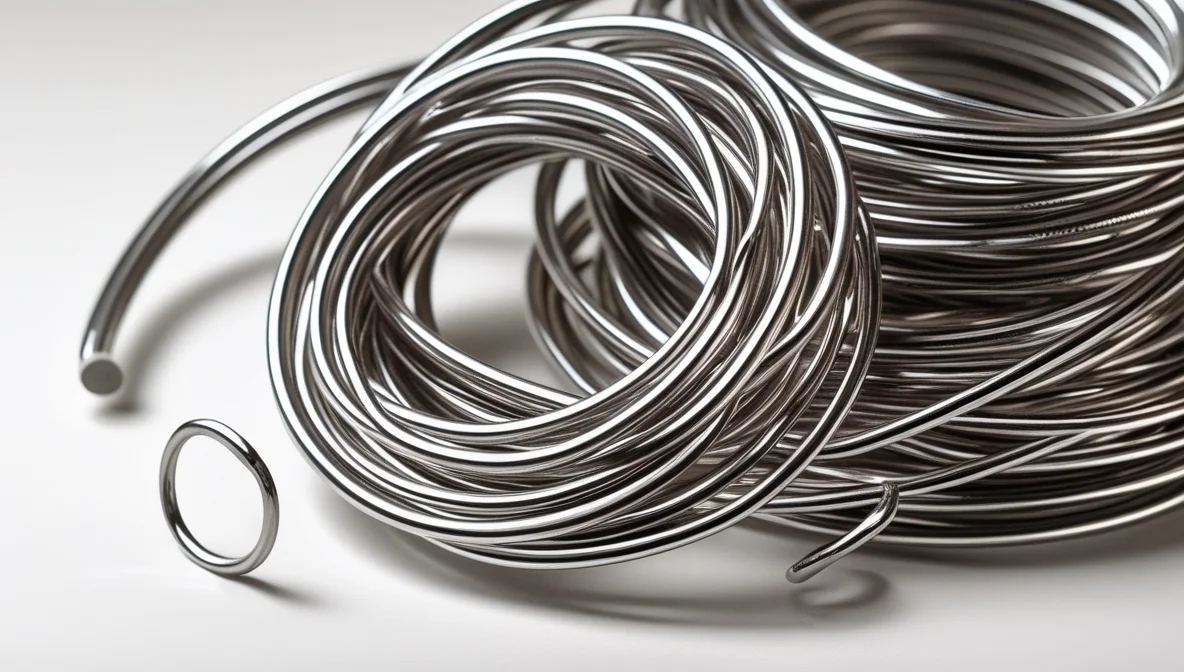When discussing the “strongest” spring wire, strength usually refers to tensile strength – the maximum stress a material can withstand while being stretched or pulled before breaking. Several materials offer exceptionally high tensile strength suitable for demanding spring applications.


Among commonly used spring wires:
-
Music Wire (ASTM A228): This is a high-carbon steel wire known for its very high tensile strength, excellent fatigue life, and uniformity. It derives its strength from heavy cold drawing. Despite its name, its primary use is in high-stress springs like small engine valve springs, automotive components, and high-performance mechanical springs. It is often considered the benchmark for strength in common spring wires, especially in smaller diameters. However, it has poor corrosion resistance and needs protective plating (like zinc or tin) or oiling in many environments.
-
Oil Tempered Chromium-Silicon (ASTM A401) & Chromium-Vanadium (ASTM A231/A232): These alloy steel wires are hardened and tempered to achieve high strength, good fatigue life, and better performance at moderately elevated temperatures compared to music wire. They are often used in larger springs subjected to high stress, such as automotive suspension springs and engine valve springs.
-
Precipitation Hardening Stainless Steels (e.g., 17-7PH Condition CH900): While perhaps not reaching the absolute peak tensile strength of the best carbon steel wires in all conditions, grades like 17-7PH stainless steel in their hardest tempers achieve very high tensile strengths (often exceeding 2000 MPa or 290 ksi), combined with good corrosion resistance and usability at higher temperatures. They offer the best combination of strength and corrosion resistance.
-
Specialty Alloys (e.g., Cobalt-based alloys like Elgiloy/Phynox): For extreme conditions (highly corrosive environments, very high temperatures, non-magnetic requirements), exotic alloys can offer exceptional strength and performance, often exceeding even high-carbon steels in specific metrics or environments, but at a significantly higher cost.
In summary, for general high-stress applications where corrosion isn’t the primary concern, Music Wire is typically considered one of the strongest commonly available spring wires, particularly in smaller diameters. For larger sizes or slightly elevated temperatures, oil-tempered alloy steels are very strong. For applications demanding both high strength and corrosion resistance, high-strength stainless steels like 17-7PH are the top contenders. The absolute “strongest” can depend on the specific wire diameter, condition, and operating environment.
What is the strongest spring wire? — This article provides a practical buyer‑focused overview with specifications, selection tips, and on‑site considerations. Explore related topics: blog.
Key Specifications and Standards
- Standards: ASTM / EN / JIS (e.g., ASTM A240/A36, EN 10088/10025, JIS G4304/G3131).
- Surface options: 2B, BA, No.4, HL, mirror; galvanized (electro / hot‑dip).
- Processing: hot‑rolled, cold‑rolled, annealed & pickled, welded or seamless.
- Typical services: slitting, shearing, cut‑to‑length, drilling, beveling, deburring.
- Documentation: MTC, CO, packing list with net/gross weight and heat numbers.
Typical Applications
Construction, machinery, automotive, energy, enclosures and fencing, food equipment (for stainless), and general fabrication. Match grade and finish to corrosion, strength, and appearance requirements.
Selection Guide
- Use certified material with Mill Test Certificate (MTC).
- Confirm standards (ASTM/EN/JIS) and tolerances per drawing.
- Match surface finish to application (2B/BA/No.4/galvanized).
- Specify dimensions and acceptable deviation upfront.
- Plan packaging and corrosion protection for transit.
Processing, Packaging and Logistics
We adopt edge protection, waterproof wrapping, rust‑inhibiting paper, fumigated pallets, and strapping suitable for sea freight. Loading photos and weight lists are provided for each shipment.
FAQs
Q: What lead time can I expect?
A: Typically 7–15 days ex‑works for standard sizes; custom processing may extend the schedule.
Q: Can you provide cut‑to‑size service?
A: Yes. We slit, shear, cut, drill, bevel and deburr to drawing to reduce waste and speed installation.
Q: How do you ensure quality?
A: Incoming inspection, process control, and final inspection with traceable heat numbers; third‑party inspection is available.
Q: Do you support small trial orders?
A: We support pilot quantities with consolidated shipping to control cost.
All values are typical and for guidance only; confirm with the datasheet and purchase order before production.
Related products: view details.
Related products: view details.



